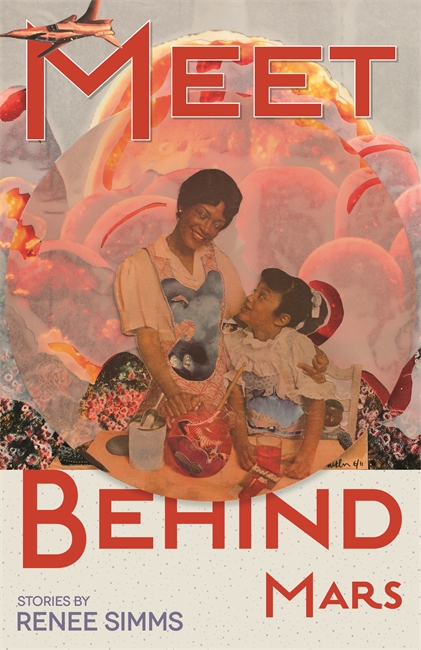Meet Behind Mars
The stories in Meet Behind Mars by Renee Simms touch on womanhood, family, sacrifice, and morals. Some of the tales are twisted with a bit of surrealism, a little Twilight Zone to counterbalance the absolutely real, cramped truth of growing up not only period, but a woman and black.
The stories in Meet Behind Mars by Renee Simms touch on womanhood, family, sacrifice, and morals. Some of the tales are twisted with a bit of surrealism, a little Twilight Zone to counterbalance the absolutely real, cramped truth of growing up not only period, but a woman and black.
Typically—and don’t hate me for saying this but—books of this nature bore me. I don’t like complaining because I do so much of it myself. However, Simms does an exceptional job detailing the hardships of existence without making it one-dimensional. Her characters don’t find life troublesome necessarily because of their gender or race, but because life itself is troublesome; however, it’s extremely pleasant, too, if you allow it to be.
In “American Industrial Physics” one of the characters found pleasure in knowing that her job helped humankind. What was the job, exactly? A veterinary assistant at Ford Motor Company, where primates were being used in crash tests. To read this and consider it fiction, the word “daring” comes to mind, but the context completely changes knowing that, in 1991, an article was written in The New York Times claiming that “19,000 dogs, rabbits, pigs, ferrets, rats and mice have been killed during the last decade in automobile safety tests performed by the General Motors Corporation.”
Simms writes fiction here, but intertwines fact without fault. “How to Leave the Midwest” is dedicated to Deletha Word, a 33-year-old woman who, in 1995:
fell to her death from the Belle Isle Bridge into the Detroit River. Ms. Word died following a violent confrontation on that bridge with Martell Welch Jr., wherein Welch beat her and tore off her clothing in front of dozens of witnesses, following a minor auto accident. Afraid of her life, Word, who could not swim, tried to escape by leaping into the water.
I apologize for such a long quote, but Simms does a better job explaining a lot of things better than I could. For example, she explains the absurdity of being a parent in the final story of the book: an epistolary, email-based comedy entitled “Meet Behind Mars.” Well, it was funny to me. I don’t know if it was supposed to be, or if mothers would find this funny, or more so relatable, therefore not funny. Who knows, but I am certain of one thing: in the story, a teacher emails the mother of a so-called “troubled” child (Jesse), informing her that her son “bullied” another kid by placing a leaf on his shirt and telling him that it was a bug. The mother, Gloria Clark, then responds to the email saying:
Hi Mrs. Manning,
I’m confused. Is this child blind?
Sincerely,
Jesse’s mom
The simplicity of this, along with its frankness, makes it a laugh-out-loud moment that emphasizes the bond between parent and child, and the lengths that the former will go to defend the latter. In one of the other emails in the story, a different teacher emails Gloria, and at the end, she signs off with:
Let me know if you have any questions.
Elena Guitierrez
Lead Second Grade Teacher
God, people will say anything to make their job sound more interesting. I was recently talking to my girlfriend about the significance of elementary schools. A majority of people without children hate when parents have the public/private school conversation, because they sound so pretentious. But, I can see this topic needs to be discussed (at length!) because if I were to go to a school down the street, I would have been an utterly different person; although, going to a quote good school where the teachers consider themselves “Lead” second grade teachers, I don’t know if that’s the best place for a child to learn. I think that Simms might agree; or not, but I hope that she does, otherwise I’m the fool for assuming anything at all.
I brought this up at the beginning, but the book is heavily influenced on the idea of family. Who doesn’t love their family? But I’m wondering why it’s so important? What makes these people any more special than anyone else? I don’t have an answer for that, but it’s just something to think about, I suppose.
“You Can Kiss All of That Bye-Bye” made me think about the trust that comes with domesticity. The narrator considers the possibility of her mother poisoning her father and turning him into a zombie. Men, women, watch out, it could happen, but I hope that it doesn’t. Time and time again, we have read and watched the postmodernist paranoia cliché take over a storyline, but Simms introduces the notion, and then debunks it by proving the speculation untrue.
I love this, and so many more things about Meet Behind Mars—especially after listening to “Star Love” by Cheryl Lynn, the inspiration behind the book’s title. Let it play in the background while you fall in love with this collection.





